6. The Night of the Hunter (Charles Laughton, 1955)
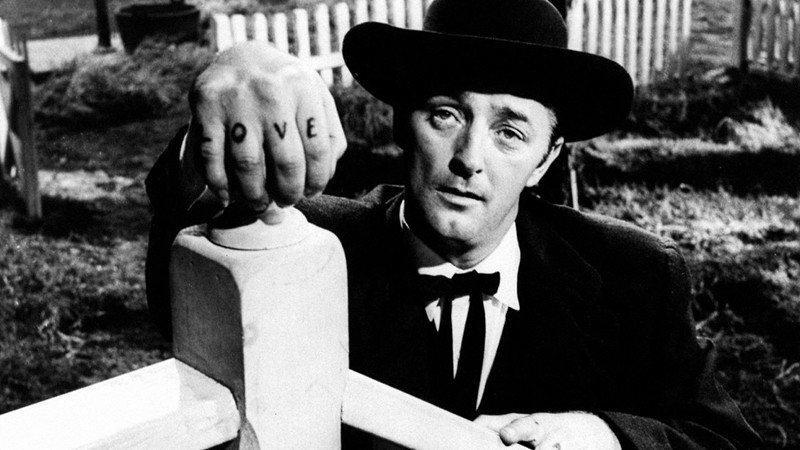
“I like villain movies. If you gathered rare villains from psychopaths to cold-blooded people in one place, you’d think, ‘How lucky it is to live without encountering such bad guys.”
Park Chan-wook knows a thing or two about writing a memorable foe, and given his particular penchant for bad guys it’s no wonder he ranks our next entry among his ten favorite films of all time. The Korean director aptly described Charles Laughton’s Deep South thriller as a bizarre fairy tale, likening it to ‘Hansel and Gretel’ adapted from a nightmare. And though there’s plenty of things to applaud in this timeless tale of greed and religious fervor, it’s hard to look past Robert Mitchum’s unforgettable outing where he brought to life one of the spookiest villains ever captured on celluloid in the form of a mischievous ex-con preacher.
Director Park praised him to the skies, arguing that together with the original Cape Fear, the film shows “the pinnacle of Robert Mitchum’s reptile performance as one of the spunkiest actors in history.”
7. Dead Ringers (David Cronenberg, 1988)
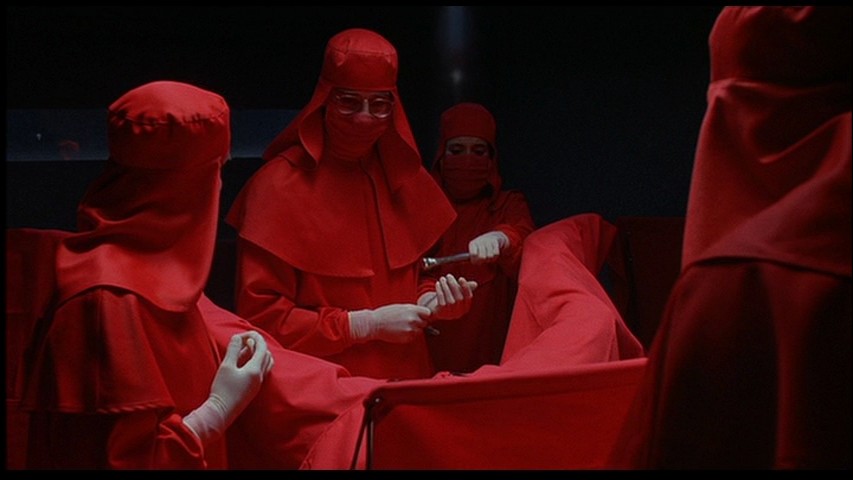
“There are two types of reporters — one who asks me about David Lynch and another who asks me about David Fincher. But my favorite David is Cronenberg… especially ‘Dead Ringers’.”
That Park Chan-wook found a kindred spirit in Cronenberg shouldn’t come as a shocker to anyone acquainted with their brand of filmmaking. Despite facing off during the latest Cannes festival (with ‘Decision to Leave’ and ‘Crimes of the Future’ spearheading the 2022 Official Competition), there’s nothing but respect between these two giants of body horror. Often pushing the boundaries of what’s acceptable in mainstream cinema as a means to explore the depths of our psyche, both Park and the Canadian seem to exist on a similar wavelength as unapologetic provocateurs who aren’t afraid to hit a nerve with their work.
In that regard, ’Dead Ringers’ is a fascinating prism through which to view many long-gestating themes that Cronenberg has been ironing out throughout his career. The film plumbs and deepens the director’s fixation on body transformation and venereal impulses by putting us in the shoes of two identical twins who exchange duties as gynecologists and trade women with little to no hesitation — that is until their life soon spirals out of control.
8. Don’t Look Now (Nicolas Roeg, 1973)
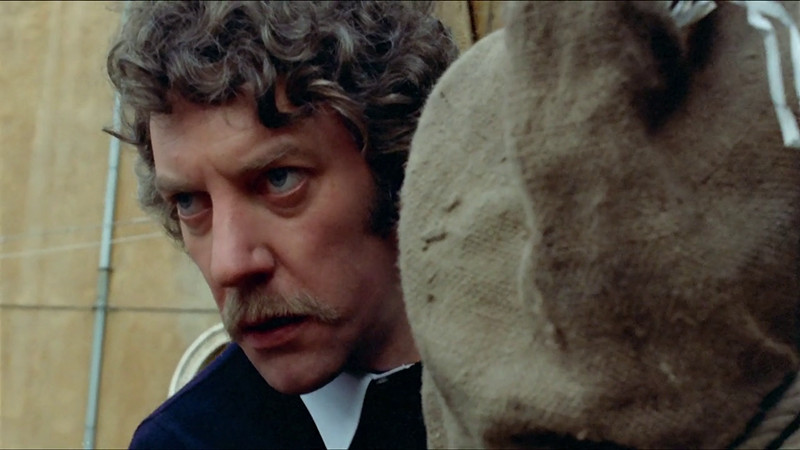
‘The Handmaiden’ ruffled quite a few feathers upon release for its explicit lesbian sex scenes — which some viewers argued to be gratuitous and provocative to a fault. However, in a story that rests almost entirely upon its portrayal of oppression, depravity and female freedom, those scenes ultimately proved to be an integral part of the plot as well as a key element of the characters’ development. During an interview conducted with Entertainment Weekly promoting his intoxicating thriller, Park Chan-wook promptly cited ‘Don’t Look Now’ as the best erotic thriller he could think of where sex is an essential part of the film.
Nicolas Roeg’s classic centers around a grieving couple who are still coping with the tragic loss of their daughter while they try to start afresh in Venice. Though for the most part the film unfolds like a textbook paranoia-filled mystery, Park pointed out to a certain sequence where we witness fragmented sex scenes between Donald Sutherland and Julie Christie (the man and his wife), interweaved with an intricate series of flash-forwards.
9. Seconds (John Frankenheimer, 1966)
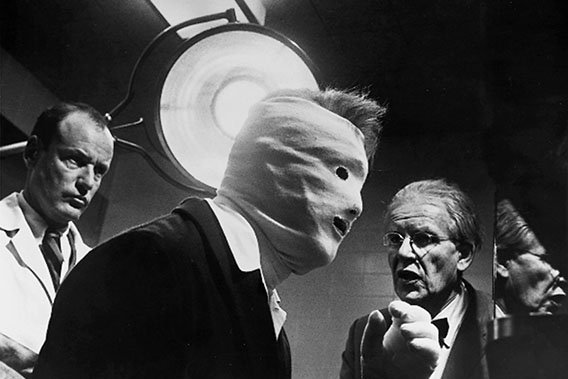
During his heydays as a young film critic, Park Chan-wook personally assembled a top ten list including his favorite films of all time. From Brian de Palma’s ‘Sisters’ to Shohei Imamura’s ‘Vengeance is Mine’, the shortlist is packed with plenty of bone-chilling entries that seem completely on-brand for the king of the grotesque. But among all ten, it’s John Frankenheimer who takes the nod for providing perhaps the closest thing to Park Chan-wook’s high-wire thrills with his 1966 dystopian thriller.
Much like many of Park’s characters, the middle-aged banker that anchors this film is disillusioned with his life and wishes to be someone else. His wishes appear to be granted after he stumbles upon a mysterious company that specializes in ‘rebirths’, where the customer undergoes a plastic surgery and adopts a brand-new identity. Park lauded Frankenheimer’s full use of wide-angle lens and rated the film highly, deeming it “the most serious commercial film in Hollywood’s history”.
10. Memories of Murder (Bong Joon-ho, 2003)
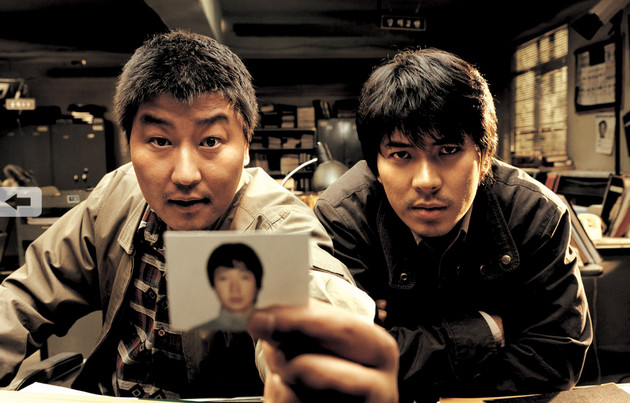
Bookending our list we turn to the most celebrated of Park’s fellow countrymen, Bong Joon-ho, with the breakout film that officially established the now Oscar-recipient as a Director with capital D.
Centered around a real-life serial killer that terrorized a Korean rural town in the ’80s, ‘Memories of Murder’ weaves us through a labyrinthine police investigation where two local detectives join forces and try to crack the case open to no avail. The film soon became a runaway success that cemented Song Kang-ho, who had previously starred in two Park Chan-wook’s films (‘JSA’ and ‘Mr. Vengeance’), as a bona fide star and turned Bong Joon-ho as a household name in his own right.
In 2003, Park Chan-wook was tied up with a little project of his own, an adaptation of a Japanese manga called ‘Oldboy’. The rest is history — but rumor has it that the fate of both directors could’ve easily been flipped. A few days after Bong had secured the rights to the popular stage play that would become ‘Memories of Murder’, Park showed up with the intention of purchasing it for himself. At the same time, Bong had allegedly shown interest in adapting ‘Oldboy’ but narrowly lost the race to his peer.
Both films turned out okay and catapulted each man to international stardom, so maybe it’s all for the best. Park personally included Bong’s sophomore effort in his curated list of films for LaCinetek, so it’s safe to say there’s no long-standing grudges between the two.